Beth Kephart's Blog, page 121
July 29, 2013
I said I was getting stupider. They said:
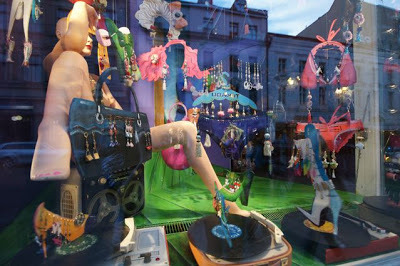
I recommend Kale.
No comprende.
I've heard both sugar and fish boost brain power. The choice is yours.
Only chocolate will help.
Carrot juice with a beet thrown in.
Dark chocolate covering pomegranates.
Last night, after putting color on my hair, I wrapped my head in Cling Wrap. It seemed to light up my brain. Just a thought.
INSPIRATION—watch a documentary!
Read hate mail. Makes you feel infinitely more virtuous and intelligent. But since I doubt you get any, I'll be happy to lend you some of mine.
(Must comment now: I write out of love, toward love. Of course I get hate mail.)
I
agree with the chocolate thing totally, but there is also a "medical
food," L-methyl folate, or Deplin by brand name which is thought to make
neurotransmitters work better. It's an rx but not a drug, whatever that
means.
Hashtag: When Facebook is your Friend.




Published on July 29, 2013 06:40
July 28, 2013
in which my nieces (and Serena) take their turn at responsive writing, at Hooray of Books
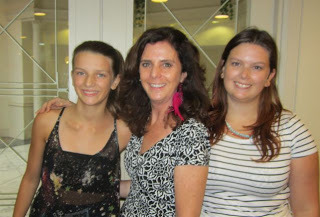
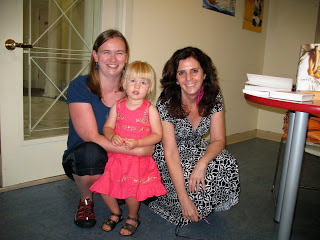
One of the very great privileges of spending yesterday in Alexandria, VA, at Hooray for Books, in the company of Debbie Levy, family, and friends, was the time we took to write together. Debbie encouraged us to write in the tradition of her mother's poesiealbum—the book of brief holocaust-era letters, urgings, and clippings that inspired her book, The Year of Goodbyes. She asked us, specifically, to think about this:
What about you are you sure your friends or classmates will remember 70 years from now? What do you hope they forget? (We adults were urged to think about what we hope long-lost friends who encounter us now will remember—and forget.)
Since we had been talking about the thin line between fiction and truth, I urged our readers/writers to take something from their pocket and write its autobiography. We heard from paperclips, car keys, phones, and a dollar bill, among other laughter-inducing things.
Here, below, are two responses. The first is by my niece, Julia, who is entering her second year at the Corcoran College of Art and Design; she is a talented photographer. The second is from Claire, whose 13th birthday I helped celebrate earlier this year. She's a big reader, a fabulous student, and all-round athlete.
The Remember? Forget? Exercise/Julia Emma Kephart Roberts
I go to a small small school in the basement of a
museum, where you can usually find me in the first cubby of one of the
largest darkrooms you've ever seen. There are about 300 students total -
smaller than my graduating high school class. I know them all by name
and face. I follow them on instagram and tumblr and flickr and every
other website imaginable. But older folks be forewarned this means
nothing in the actual relationship I have with these people. It also
means nothing in regards to what I know about them or what they know
about me. What stands out to one person about myself could be completely
overlooked or misread by another. Because if you think about it, none
of us really know what is remembered or forgotten or even if any of it
is true or false, just what we remember about ourselves.
Autobiography of a SmartPhone/Claire Kephart Roberts
There’s a sad but almost happy loneliness the comes with being
placed in someone's back pocket and sat on about a hundred times each day. You don’t
get to choose what you wear, how you act, or most of all who you are.
Everything about you is decided by someone of a higher standard. Although I am
smarter then most significants around me I have no choice but to sit quietly
and do what I am told. But the idea that my quietness has changed the life of
anyone who finds me and my friends is almost remarkable. Significants put their
life in us, what we hold is more then a game and social websites, everything
typed and every scratch we acquire puts a new, maybe scary thought in our
significant's head. Every little thing we do slowly eventually will blur our
significant's lines until unreadable and they have no choice but to totally
completely rely on us until we ourselves rule them.
And then there's this amazing narrative about our day together, written by Serena Agusto-Cox, who dressed her super-well-behaved little girl in bright pink and shared her with us. Serena has a response to the writing prompt in this post—a beautiful poem. I encourage you to click this link, and read it for yourself.




Published on July 28, 2013 14:20
at Hooray for Books, with Debbie Levy, family, friends
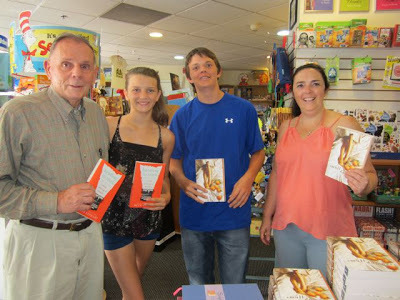
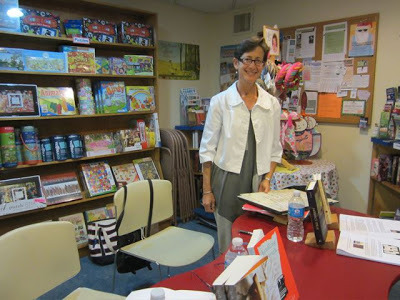
We may all have niches of incapability, but I suspect that I have more than most. Making perfect corners on a bed is on that list. So is watching blood-soaked horror films. So is driving alone in high traffic for several hours.
Yesterday, however, I overcame Incapability Number Three and drove alone to Alexandria, VA, to spend time at Hooray for Books. Jessica Shoffel of Penguin had already told me what a great place this was. Ellen, the proprietor, had mentioned the chance to share the afternoon with Debbie Levy. And I have family in those parts—my sister and her three children.
So I was there, I drove, I conquered. And I will be forever glad that I did. Hooray for Books is a beautiful enterprise, right there on King Street, in a town that is ripe with interesting shops and cupcake nooks. Debbie Levy—whose new book, Imperfect Spiral, I will be writing of here soon—is a one-hundred-percent class act. So talented, so well-prepared, so interesting, so thoughtful, so professional that I had to stop my feather-earringed self from standing up and shouting "yes!" as she spoke. What a conversation we had about truth, fiction, and the line in between. What unexpected side trips we took as we explored form and economy. And when we proposed to our gathering that they join us in a mini writing workshop, the room was game. We heard from writers of all ages, and we heard fine tales. We had so much fun that we decided to take our show on the road. We may still need a booking agent. But we've already got our drummer—Patrick, who works at Hooray for Books—who blew us away with his charm and words.
But look at the first photo here. That is my family. My father, who was in Alexandria to spend time with his grandchildren, my sister (just back from San Diego), and her two younger children, Claire and Daniel; Julia, her eldest, a photographer, joined us later. I am used to trekking out on book talk missions alone; it was incredible to have family near. I had made them many promises about the goodness of Debbie Levy, and Debbie lived up to every inch of them.
Great thanks to Serena, who joined us with her family, and to Deborah and Will, gracious hosts. And thank you to the wonderful guests who contributed so much to the day. I signed my first in-store copies of Handling the Truth yesterday, signing copy number 1 to a fourteen-year-old girl who had arrived with her parents and who expressed such interest in reading and writing that it will fuel me for a very long time. And I signed my first paperback copies of Small Damages. That, too, was a fine, fine thing.




Published on July 28, 2013 05:53
July 27, 2013
and now for some professional ballroom dancing (and headed to VA)
... featuring my friends Jean Paul and Lana Rossi, who were also featured in the movie The Silver Linings Playbook. Sometimes I even dance with Jean. I don't dance anything like that.
I'm off to Alexandria, VA, to Hooray for Books, to talk about truth and fiction with Debbie Levy, whose new book, The Imperfect Spiral, just arrived here last night. I've read the first twenty-five pages this morning and I'd do anything to stick around and finish. It's just that good. I'll write of it when I can.
Alexandria, VA, marks the first time I will see the Small Damages paperback and Handling the Truth in a store. My niece Claire will join us. It will be a special day.




Published on July 27, 2013 06:35
July 26, 2013
Reflecting on Here/There Memoirs in Today's Publishing Perspectives
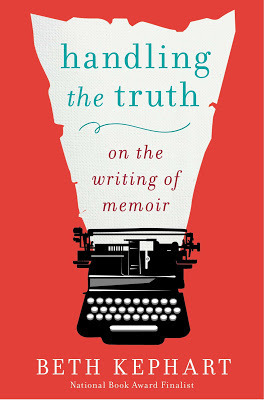
Today in Publishing Perspectives, a digital magazine about the international world of books, I'm reflecting on a sub-species of memoir I like to think of as Cross-Border memoirs, or Here/There memoirs.
I kick the piece off with thoughts about the great Michael Ondaatje's indispensable Running in the Family, then move on—toward Edwidge Danticat, Anthony Shadid, and Sophia Al-Maria.
The heart of the piece is here, below. The whole can be found here. So many thanks to Ed Nawotka for giving me room to think out loud.
More about memoirs I love, memoir exercises, and Handling the Truth can be found here.
All memoirists travel across the accordion folds of synapses and time.
Border-crossing memoirists additionally move back and forth across space
— past signposts, over deckled landmasses, into new weather, toward the
science of geomorphology. Their points of view are duality inflected.
Their vocabularies are exotic and hued. Their ideas about home are
perforated and embellished by contrasts, contradictions, and corporeal
compromise.
Finally, on a related (sort of matter), I will be in Alexandria, VA, this weekend at Hooray for Books, with the phenomenal Debbie Levy, whose work crosses many borders. We begin at 3:30. Readers and writers are both welcome. We're going to be talking about international books, and about truth and fiction and the line between. Many thanks to Serena, who is helping to spread the word, here.




Published on July 26, 2013 03:06
July 24, 2013
Handling the Truth in The Smart Set (and on Philly.com)
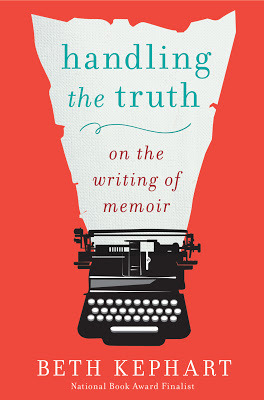
I know. The title of this post grabbed you. Indeed, you did a double take. A Beth book? In something called The Smart Set? What's the catch?
The catch is that the person who is actually writing for The Smart Set, a Drexel University publication, is super smart. His name is Nathaniel Popkin, and he reads all these books I didn't even know existed, and he has a knack for finding connections among and between things, and he's very nice to me.
He also claims I'm funny.
That got you, too, didn't it. Beth Kephart? Funny?
In any case, here's the link to Nathaniel's thoughtful piece. And here's a slice from it:
Kephart ... is assertive and defiant —
and downright funny — about the literary value of memoir, a genre that
some critics see as spent, imaginatively thin, and sentimental. So
confident and playful, so taken is she with words, so willful is she
about the transformative power of literature that at times in Handling the Truth
she begins to sound like Rawi Hage’s Fly. “Call me sentimental; others
have,” she writes. “Remind me that the world is dark and ugly, that
people are cruel, that injustice reigns, that children suffer, that the
wrong people win, the wrong people triumph. I know. I have been there. I
have seen. I have lost to the infidels once or twice myself.”
Okay, whoops. A postscript. The unsinkable Nathaniel Popkin has just informed that a second piece, by his truly, is now up on Philly.com (here). Now he's calling me defiant. Me! Defiant! All right. I'll be defiant then. After all, yesterday a certain reporter from Montgomery News suggested that I might be a bird.
From Nathaniel Popkin's Philly.com review:
All this sage advice and the wide-ranging texts she employs to support it make this book useful for any writer, in just about any form (and all forms cross-pollinate and cross over anyway). Working on a novel? Well, you'd better have empathy. Consider yourself a poet: probably a good idea to listen equally well to yourself and the outside world. A journalist? Your stories will be all the more powerful if you can ascribe meaning to prosaic events.




Published on July 24, 2013 11:04
working on my Berlin novel author questionnaire, remembering Berlin
Published on July 24, 2013 06:50
Joining Stacey D'Erasmo at AJC Decatur Book Festival
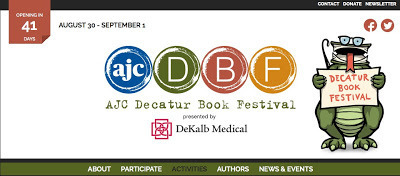
Readers of this blog know how much I admire Stacey D'Erasmo—her fine
mind, her original insights. I'm delighted, therefore, to be joining
Stacey on the Old Courthouse Stage on Saturday, August 31, at the AJC
Decatur Book Festival, for a conversation titled "Personal Truths: On
Writing Intimacy and Memoir."
Details can be found here.
My thoughts about Stacey's new book, The Art of Intimacy: The Space Between, can be found here.




Published on July 24, 2013 03:13
July 23, 2013
Am I a bird? Montgomery News asks, while talking Dr. Radway and Handling the Truth

I was feeling particularly inept and incapable today—doing countless things of indeterminate value (save for the thirty minutes I spent reading James Wood and thinking about literary mimicry) and wondering whether I'd ever feel literary again. (Such wondering has become a running motif.)
Then Nicolette Milholin, the Book Bound Columnist for Montgomery News, sent me a story she had written about me and a few recent books. I read the first paragraph and burst out laughing, and then I had this thought: If I do nothing else today, I will have laughed.
Which counts for a lot of something.
So thank you so much Nicolette. Here's that first graf, below. And here's a link to the whole.
Say you want to be a writer, a published author, an acclaimed figure who
just can’t help letting those words flow, a writer so prolific that
your email signature rightly boasts “author of 16 books.” Where do you
turn for guidance and inspiration? It’s a bird. It’s a plane. It’s Beth
Kephart!




Published on July 23, 2013 10:46
every act of literary mimicry is ultimately transparent

I'll interrupt most anything I'm doing for a chance to read a James Wood essay. This morning I got up early to read "Sins of the Father: Do great novelists make bad parents?," the latest Wood contribution to The New Yorker.
Fascinating, all of it—how wouldn't it be? It's Wood on the memoirs written by the children of famous novelists—Janna Malamud Smith (on Bernard Malamud), Alexandra Styron (on William Styron), Susan Cheever (on John Cheever), and (the real focus of this essay) George Bellow on his father, Saul.
About the first three, Wood writes: "All three are vibrant storytellers, alert to scene and detail, almost sickeningly sensitive to the way that large male egos stage themselves; they know that, in some odd combination of respect and revenge, they are turning their fathers into novelistic characters."
About Bellow, Wood is not nearly as convinced. "It is less a memoir than a speaking wound," Wood writes, of Saul Bellow's Heart: A Son's Memoir. And then he proceeds to show us how.
But what really caught my eye in this essay were the words of Bellow himself. Wood has just noted how, "in the greatest novels, the ghost of the author's soul rustle into life." Then he quotes Bellow:
When you open a novel—and I mean of course the real thing—you enter into a state of intimacy with its writer. You hear a voice or, more significantly, an individual tone under the words. This tone you, the reader, will identify not so much by a name, the name of the author, as by a distinct and unique human quality. It seems to issue from the bosom, from a place beneath the breastbone. It is more musical than verbal, and it is the characteristic signature of a person, of a soul.
Yes, I think. Oh, yes. Every real writer is in possession of his or her own true voice—tones, patterns, structures, rhythms, ways of seeing that erupt from a life lived like no other life will ever be lived. I write, for example, the way I write because I skated once, and because I am a middle child (always), and because I traveled to certain places at certain times and saw things and felt things and they recur, and because I have fought and lost and fought and barely won. It's all in there, for good or for bad—and I'm not just talking about plot. The sentences loop. The images are elided. There are sudden stops and odd angles and gush, mid-course corrections. Some people cannot tolerate my way with words, and that is fine. But it is my way with words, and no matter how many different genres I write, no matter how many different locations I set my stories in, no matter how old I get, it is me, Beth Kephart—perhaps not a fully realized real writer yet, but one who works hard at the craft—at the keyboard.
So every writer is in possession of his or her own true voice. And every act of mimicry, correspondingly, is transparent—a short cut, a tool, an exercise in industry as opposed to an expression of something raw, dredged up, authentic. The imitating writer may believe she'll get away with this, that no one will notice, that it will be fine. But inevitably there are breaks and gaps and awkward gestures that out the act of shadow writing. The images and patterns have been borrowed. The work has not been forged.




Published on July 23, 2013 06:27






